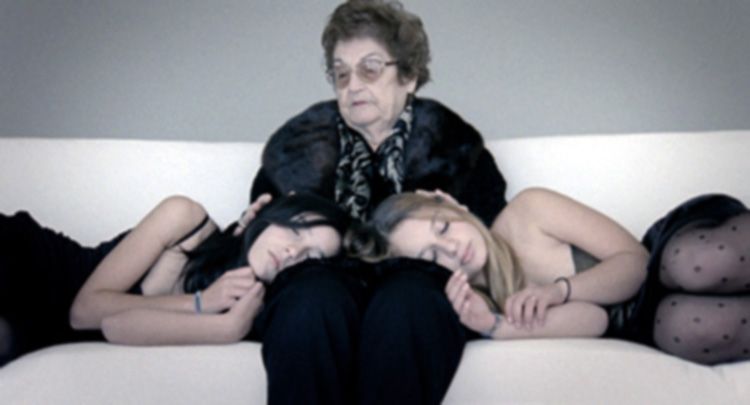Palácios de Pena (2011)
Palaces of Pity
59 min
Realização: · Gabriel Abrantes · Daniel Schmidt
Argumento: · Gabriel Abrantes · Daniel Schmidt
[Haunted by their own directionless lives, two pre-adolescent girls reunite while visiting their ailing grandmother. In the midst of her fantasies of a medieval past – one consumed by fear and desire – the two girls are transformed and confront a legacy of oppression. “Love is finally, / an entrancement of legs, / a union of bellies, / a brief tremor of arteries, / a confusion of mouths, / a battle of veins, / a rolling of thighs, / whoever says otherwise is a beast.“ (Gregório de Mattos, 17th century) “Oh my boy, what will happen to me if I lose you from sight! What will happen to me if I see you bit by bit, I hope to be always, always seeing you! But, as I have no liberty to do so, I die, so I rest without you embracing me! Now shake, shake little puppy, for you, for you little heart, now shake, yes, yes, yes, oh my little heart, give me your arms because there I want to die.“ (Letter from Frei Francisco da Ilha da Madeira to Frei Mathias de Mattos –1690 circa) .
- Palácios de pena is about a culturally inherited fear in Portugal, linked to political and social oppression during the Inquisition and Fascism. It revolves around two upper-middle class adolescent Portuguese girls, juxtaposing their budding identities to a trial condemning two Moorish homosexuals to burn at the stake. Their ailing grandmother gives them an awareness of their heritage through the mechanism of desire, describing a dream where she is a judge of the Inquisition. The grandmother’s and the girls’ guilt is complicated by their relationship, that of family and love. As they love each other, so does what they represent: ignorance and the will to violently oppress.
(Director's Statement)]
Mais informações: Website externo
- [Trailer]
- Alcina Abrantes
- Ana Rita Franco
- Andreia Martins
- Bernarda Dos Bois
- Catarina Gaspar
- Daniel Schmidt
Argumento: · Gabriel Abrantes · Daniel Schmidt
Direcção de Fotografia: · Natxo Checa · Eberhard Schedl
Montagem: · Daniel Schmidt · Gabriel Abrantes
Produção: · A Mutual Respect
Realização: · Daniel Schmidt · Gabriel Abrantes
Som: · Daniel Schmidt · Gabriel Abrantes


No meio das suas fantasias com um passado medieval - consumido pelo medo e pelo desejo - as duas raparigas sofrem uma transformação e enfrentam um legado de opressão.
"O amor é, finalmente, um cruzamento de pernas, uma união de barrigas, um breve tremor de artérias, uma confusão de bocas, uma batalha de veias, um enrolar de coxas, quem disser o contrário é uma besta." Gregório de Mattos (séc. XVII).
[Fonte: Gabriel Abrantes, Daniel Schmidt]